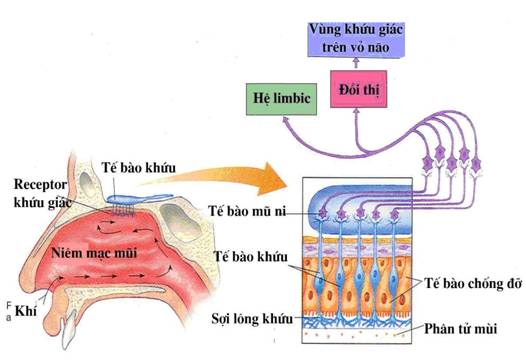F0 recovered from panic attacks from smelling fragrances into stench
2 months after recovering from Covid-19, Ms. Diem had a disorder of smell. The scents of perfume, fabric softener, shower gel… she smelled like bugs, gasoline, even burning garbage.
Ms. Hoai Diem (HCMC) has been infected with Covid-19 since December 2021. For about 10 days, she only suffered from fatigue, runny nose, loss of sense of smell but no loss of taste. After getting negative results about 4-5 days, she gradually regained her sense of smell.
However, 2 months later, new trouble came when she had a disorder of smell. At first, the scents such as perfume, fabric softener, shower gel, shampoo, floor cleaner… she smelled like a very strong, stench, very unpleasant smell. Not only that, the smelly vegetables such as: lettuce, laksa leaves, cilantro or fruits like cucumber, watermelon, lemon…. she found it to have a strong smell like the smell of bugs, gasoline. Even the smell of coffee or dishes such as beef vermicelli, vermicelli … also becomes a burning smell like burned plastic waste.
“I am extremely stressed because this has been going on for more than a month and more and more things are changing. When bathing or doing activities, I will also be uncomfortable because of the burning, obsessive smell. Every time I wash and dry clothes, I become obsessed with the smell of washing powder and fabric softener, “said Diem.
Having an odor disorder makes her lose her appetite but even so, to have health She still has to try to eat or choose light-flavored foods. For more than a month, her condition has not improved, making Ms. Diem extremely worried.
In this regard, Dr. Dang Xuan Thang – University of Medicine and Pharmacy – Duy Tan University of Danang, said, this is the phenomenon of Parosmia, which means a disorder of the sense of smell. People with olfactory disorders post-Covid-19 often smell burning rubber, garbage, sewage, mud…
 |
| The mechanism of action of the sense of smell |
“Olfaction disorder occurs when only certain chemical receptors of the nose are active, so the olfactory brain only receives part of the chemical signature of the smell, resulting in a ‘distorted’ smell. The second reason is that the sensors in the nose work, but the brain cannot process the information received from the nose, like when there is damage to the nerves in the olfactory tract, “said Dr. Thang.
To explain this phenomenon, Dr. Thang analyzed, the SARS-CoV-2 virus enters cells mainly through the interaction between the virus’ Spike protein (S protein) and the ACE2 receptor in the target cell. The main sites for SARS-CoV-2 to enter are the lungs and gastrointestinal tract. Recently, scientists discovered that furin protease is also involved in the infection process for SARS-CoV-2, which increases the infectivity of SARS-CoV-2 as well as provides a pathway to The virus enters the central nervous system. The two main routes of infection are hematogenous and neuronal – with the olfactory route (because nasal cells have a high density of ACE2 receptors).
SARS-CoV-2 appears to enter the CNS via the olfactory nerve or the trigeminal nerve. The pathogenesis of Covid-19-associated olfactory loss is still under debate. One theory is that it may result from obstruction of the olfactory clefts, thereby preventing the activation of sensory neurons in the olfactory epithelium.
In addition, there is another type of cell in the nose located next to the olfactory neurons called prop cells that express ACE2. These cells support the olfactory nerve cells in the nose and can die from infection. However, loss of propagules does not lead to death of olfactory neurons but to sensory dysfunction (caused by cilia contraction), which may resolve for the sudden loss of sense of smell.
Dr. Thang said that studies have shown that patients with olfactory disorders can recover 15 to 20 days after the onset of the disease, which means that many people will improve their sense of smell on their own. without any specific treatment. However, there are many cases of olfactory disorders that persist beyond that time and require appropriate treatment.
Here are some therapies:
1. Smell training: For 12 weeks, the patient did one session in the morning before breakfast and one session in the evening before dinner. Patients were advised to smell six essential oils such as lemongrass, rose, clove, rose geranium, mint, and coffee bean. They should try to recognize the smell without reading the label on the bottle.
2. Use of Caffeine: Several studies have shown that caffeine enhances the sense of smell in people with Covid-19. The use of coffee as an olfactory restoration strategy in anosmia has been applied in different variations using odors such as herbal, ginger, mint, coffee and lemon to help patients. identify different odors.
3. Vitamin A: Retinoic acid (RA) – a metabolite of vitamin A, is one of the thyroid hormones. It is an important transcriptional regulator during tissue growth and regeneration. Vitamin A can promote olfactory nerve epithelium regeneration.
4. Alpha-lipoic acid (ALA): Scientists have found higher levels of the cytokine TNF-α (pro-inflammatory) in the olfactory epithelium in patients with Covid-19, suggesting that inflammation Direct involvement of the olfactory epithelium may play a role in acute olfactory loss. According to previous reports, alpha-lipoic acid can decrease ACE2 activity after SARS-CoV-2 replication, resulting in inhibition of the expression of inflammatory cytokines. However, it also causes common neurological side effects including headache, dizziness, and confusion.
5. Corticosteroids: The BRS recommends nasal spray corticosteroids in patients with loss of smell for more than 2 weeks associated with nasal symptoms, but does not recommend oral use. This drug has a lot of side effects when used inappropriately. Inhaled corticosteroids usually do not cause serious side effects, some common side effects (oral thrush, hoarseness) should be used with extreme caution.
6. Theophylline: Theophylline is believed to aid in the regeneration of the olfactory nerve epithelium. Oral treatment of this group is limited due to side effects. On the other hand, the improvement in symptoms with this nasal spray was faster and did not cause any systemic side effects.
Dr. Dang Xuan Thang further emphasized, patients only use drugs when they are examined and consulted by doctors, especially with corticosteroids. You should clean the surrounding environment, avoiding dust and fumes that stimulate an inflammatory response in the upper airways. In addition, patients need to have a reasonable diet, increase physical activities to improve health.
For patients with a history of allergic diseases such as allergic rhinitis, asthma, etc., it is necessary to avoid allergic triggers. At the same time, the patient needs to regularly practice olfactory recovery exercises.
Ngoc Trang
at Blogtuan.info – Source: vietnamnet.vn – Read the original article here



